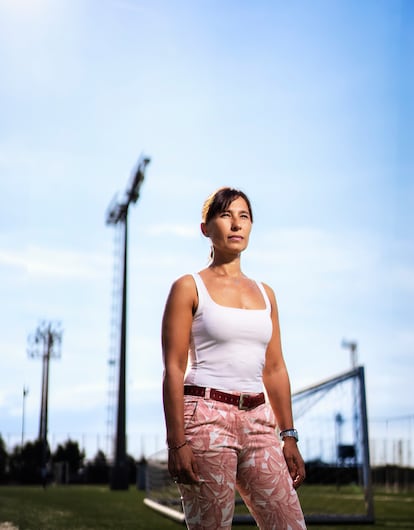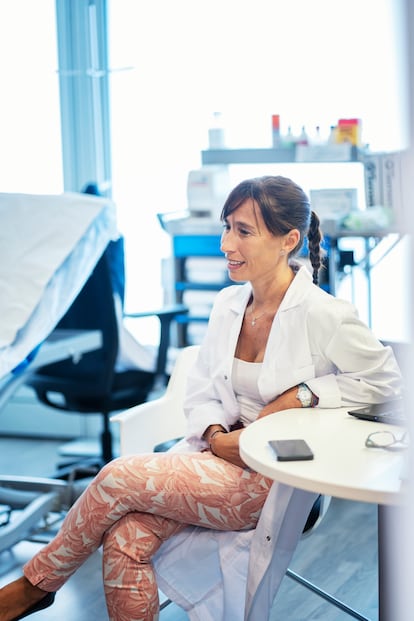Why are ligament injuries more common in female soccer players?
Dr. Eva Ferrer of FC Barcelona studied the link between menstrual cycles and tendon damage in her team’s athletes

The biggest women’s soccer star of the past decade — Megan Rapinoe — has torn knee ligaments twice in her career. Spanish professional player Alexia Putellas (FC Barcelona) suffered the same injury and missed the most recent UEFA European Women’s Championship. Real Madrid star Caroline Weir’s knee also gave out before the start of the current season. The list of players with anterior cruciate ligament injuries is long and includes stars like England’s Leah Williamson and Beth Mead, France’s Katoto and Cascarino, and the Netherlands’ Miedema. Female soccer players experience up to five times more knee ligament injuries than men, and sports medicine researchers have been investigating the cause for years. FC Barcelona Femení, through the Barça Innovation Hub, took the approach of studying the menstrual cycles of its players to understand how hormones impact ligaments.
“The theory suggests that higher levels of estrogen can increase the risk of soft tissue laxity injury, which in turn can lead to ligament problems. Estrogen levels are typically highest at the beginning of the menstrual cycle, immediately after menstruation ends. That’s why it’s important to be more cautious at that time,” said Dr. Eva Ferrer, whom we interviewed at the Joan Gamper Sports City’s medical center in Sant Joan Despí, on the outskirts of Barcelona.
Ferrer has been FC Barcelona’s women’s team doctor for the past four years, and has been leading a study conducted by the Barça Innovation Hub since last season. The study aims to identify a methodology for monitoring the levels of estrogen and progesterone in players, with the goal of preventing injuries and enhancing training performance. Estrogen is known to improve muscle, while progesterone enhances endurance. However, due to the challenges associated with measuring hormonal levels, developing individualized training programs is difficult.

A study was conducted with 40 FC Barcelona players over a period of three months. Saliva and blood samples were taken every Monday to assess their hormone levels. The findings revealed that blood samples provide more comprehensive information compared to saliva. Was Alexia Putellas having her period when she injured her knee? “I can’t tell you,” said Ferrer, claiming confidentiality of medical information. While the scientific community believes there is a hormonal relationship with injuries in women’s soccer, no study has definitively established this link. “It’s one more factor affecting a woman’s hormones, like stress, nutrition and rest. The goal is to minimize the risk of injuries,” said Ferrer.
Scientific studies on menstruation in athletes frequently produce contradictory results because this type of research is so new. “Studies on women’s health have historically received less attention, not only in sports but in general. This is largely due to the challenges in assessing results caused by hormonal changes. However, it’s important to acknowledge and understand these differences,” said Ferrer. Even when the athletes openly discussed how menstruation affected their performance, it was not given due consideration.
Dr. Eva Ferrer’s study complements a broader project by the Barça Innovation Hub, which examines genetic factors associated with injuries. “Currently, if you go to a hospital with cancer, a genetic study can help determine the most suitable treatment and predict the potential evolution of that type of cancer. But this type of data-driven analysis is lacking in sports. We believe that our work should be expanded to involve 1,000 more players. This is crucial considering that the number of female soccer players is estimated to reach 60 million worldwide in the coming years,” said Dr. Gil Rhodes, Barça Innovation Hub’s top doctor.
Sign up for our weekly newsletter to get more English-language news coverage from EL PAÍS USA Edition
Tu suscripción se está usando en otro dispositivo
¿Quieres añadir otro usuario a tu suscripción?
Si continúas leyendo en este dispositivo, no se podrá leer en el otro.
FlechaTu suscripción se está usando en otro dispositivo y solo puedes acceder a EL PAÍS desde un dispositivo a la vez.
Si quieres compartir tu cuenta, cambia tu suscripción a la modalidad Premium, así podrás añadir otro usuario. Cada uno accederá con su propia cuenta de email, lo que os permitirá personalizar vuestra experiencia en EL PAÍS.
¿Tienes una suscripción de empresa? Accede aquí para contratar más cuentas.
En el caso de no saber quién está usando tu cuenta, te recomendamos cambiar tu contraseña aquí.
Si decides continuar compartiendo tu cuenta, este mensaje se mostrará en tu dispositivo y en el de la otra persona que está usando tu cuenta de forma indefinida, afectando a tu experiencia de lectura. Puedes consultar aquí los términos y condiciones de la suscripción digital.








































